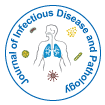The Future of Global Health: Strategies to Combat Infect
Received Date: Jan 08, 2024 / Accepted Date: Jan 31, 2024 / Published Date: Feb 02, 2024
Abstract
The future of global health necessitates comprehensive strategies to combat infectious diseases in an increasingly interconnected world. This abstract discusses key strategies for addressing the evolving landscape of infectious diseases and promoting health equity on a global scale. Emphasizing the importance of collaboration, innovation, and resilience, the abstract highlights the following key points:
1. Multisectoral collaboration: Effective global health strategies require collaboration among governments, international organizations, academia, industry, and civil society. By leveraging collective expertise and resources, countries can strengthen health systems, enhance disease surveillance, and coordinate response efforts to address infectious disease threats.
2. Innovation and research: Investing in research and innovation is essential for developing novel tools, technologies, and interventions to combat infectious diseases. Advances in genomics, artificial intelligence, and digital health offer promising opportunities for disease detection, surveillance, and treatment. Additionally, supporting interdisciplinary research initiatives can deepen our understanding of disease dynamics and inform evidence-based strategies for disease control and prevention.
3. Health systems strengthening: Strengthening health systems is critical for building resilience and ensuring universal access to quality healthcare services. Investing in primary healthcare, disease surveillance, and emergency preparedness can improve health outcomes, reduce disease burden, and enhance community resilience to infectious diseases.
4. Global health equity: Promoting health equity is integral to achieving sustainable improvements in global health outcomes. Addressing social determinants of health, reducing disparities in healthcare access, and empowering marginalized populations are essential for ensuring that all individuals have the opportunity to lead healthy lives, regardless of their socioeconomic status or geographic location.
5. Prevention and preparedness: Prioritizing prevention and preparedness efforts is essential for mitigating the impact of infectious diseases on public health and socioeconomic development. Implementing vaccination programs, promoting hygiene practices, and strengthening public health infrastructure can prevent disease outbreaks and minimize their spread, thereby safeguarding global health security.
In conclusion, the future of global health hinges on coordinated efforts to combat infectious diseases through multisectoral collaboration, innovation, health systems strengthening, global health equity, and proactive prevention and preparedness measures. By adopting a holistic approach that addresses the root causes of disease and promotes sustainable health solutions, countries can build a healthier, more resilient world for future generations.
Citation: Fernández M (2024) The Future of Global Health: Strategies to CombatInfect. J Infect Pathol, 7: 221.
Copyright: © 2024 Fernández M. This is an open-access article distributed underthe terms of the Creative Commons Attribution License, which permits unrestricteduse, distribution, and reproduction in any medium, provided the original author andsource are credited.
Share This Article
Recommended Journals
Open Access Journals
Article Usage
- Total views: 526
- [From(publication date): 0-2024 - Apr 16, 2025]
- Breakdown by view type
- HTML page views: 338
- PDF downloads: 188
